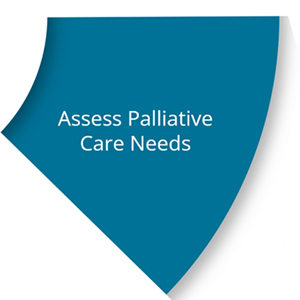 Assess Palliative Care Needs
Assess Palliative Care Needs
Assessment helps us monitor for changes and identify existing or emerging care needs. They can guide care planning and referral needs, where appropriate.
Once you know a person is approaching the end of life, a comprehensive needs assessment can support the best possible quality of life.
-
What to assess
-
How to assess
-
Talking with the family
-
When to reassess
- Physical symptoms and concerns such as pain, breathing, eating, sleeping and cognition.
- Social wellbeing including family support, carer needs, social supports and practical issues.
- Psychological wellbeing including worries, depression, distress and any supports needed.
- Spiritual wellbeing including beliefs, traditions, hope and comfort.
- Talk with the person and family together to find out more about what they need. The team can then plan for care based on this.
- Family discussions can help indicate whether a specialist palliative care service is needed for complex concerns.
- Sudden changes may occur so reassess if the person’s functions or symptoms change quickly.
- The person should be reassessed after a fall or an acute illness.
- If the person needed to go to hospital, reassess them and their plan when they return.
- You may need to reassess after talking about treatment and what the person wants or does not want.
Routine monitoring is good practice and helps you to focus on what is most important for the person.
If the person’s needs change, it can help you decide if a specialist palliative care service is needed and avoid ineffective treatment.